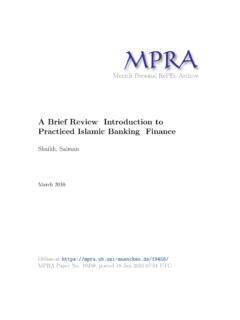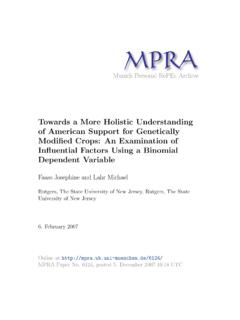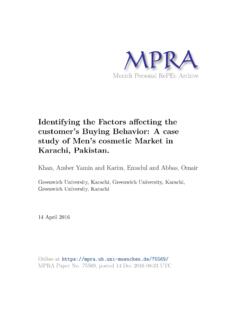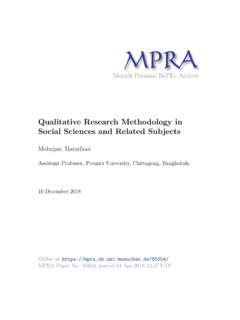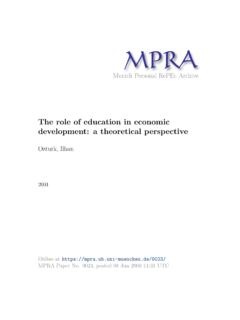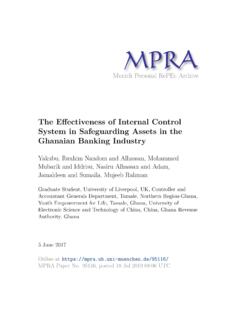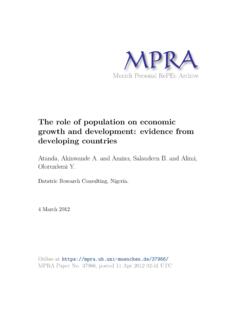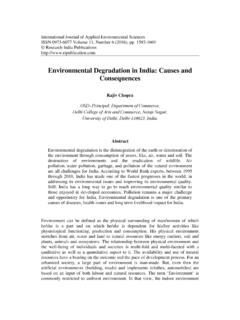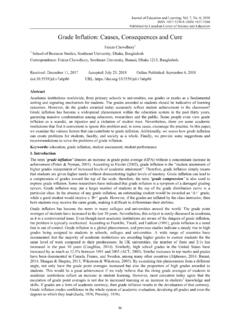Transcription of Causes and Consequences of Inflation - LMU
1 Munich Personal RePEc ArchiveCauses and Consequences of InflationBagus, Philipp and Gabriel, Amadeus and Howden, David2014 Online Paper No. 79608, posted 09 Jun 2017 04:57 UTC1 This article can be cited as: Bagus, Philipp, David Howden and Amadeus Gabriel. 2014. Causes and Consequences of Inflation. Business and Society Review 119(4): 497-517. It can be found at: Causes and Consequences of Inflation1 Philipp Bagus Associate Professor of the Economics Department Universidad Rey Juan Carlos Madrid, Spain David Howden Professor of Economics St. Louis University Madrid, Spain Amadeus Gabriel Assistant Professor Department of Finance and Economics La Rochelle Business School La Rochelle, France Abstract: While ethical implications of direct taxation systems have recently received renewed attention, a more veiled scheme remains unnoticed: inflation. We overview the Causes of inflation and assess its Consequences . Salient wealth redistributions are a defining feature of inflation, as savers and fixed income individuals see a relative wealth reduction.
2 While avoiding this tax is difficult in many instances due to the primacy of money in a monetary economy, the tax codes of most developed countries allow avoidance techniques to be employed. We analyze three ways that inflation may be avoided in an attempt to preserve personal wealth, as well as the Consequences of such practices. Keywords: inflation, taxation, costs of inflation, price stability 2 Causes and Consequences of Inflation Introduction Much recent literature focuses on the ethics of direct taxation (Joel Slemrod 2007; Bagus et al. 2011; Robert W. McGee 2012c). Whether income and consumption taxes are imposed coercively on both consumers and producers has long been contested. This being as it may, taxes can be, and often are, remitted to the government voluntarily as if they were not reliant on their coercive imposition. In this case we are led to believe that there is no difference between taxation and voluntarily donations of money to the government both will result in spending that is consistent with taxpayers desires.
3 The curiosity that arises is that if people did donate money voluntarily to the government, neither coercion or taxation would be necessary. This has led some to deem taxation as an inefficient and involuntary disruptor of the process of economic calculation (Bagus et al 2011).2 While effects from the system of direct taxation have been adequately addressed, there is a more obscure, if ubiquitous, form of taxation affecting all market participants. Inflation that loss of purchasing power savers suffer as a result of inflationary monetary policies is another means of government finance. The government acquires resources in both cases of taxation. Under direct taxation schemes the government acquires money from the public directly. Through inflation the government uses its monopoly on the supply of money to create new money or to receive newly created money from a legally privileged banking The government can buy resources from the public with the new money, thus bidding up prices and imposing an implicit cost on the public.
4 Resources are transferred from the public to the government in a similar manner to direct In both cases the public has command over fewer resources 3 and the government over more. This paper sheds light on the role of inflation in government finance and the effects thereof. It starts by looking at the Causes of inflation, specifically focusing on its use as a form of taxation. The effects of inflation both economic and ethical will be outlined, along with corresponding methods to evade or avoid these results. Finally we will assess some legal implications of avoiding inflation and conclude with a look at the benefits and costs that accrue to individuals who do so. Inflation Veiled and Costly Although inflation has a storied history among economists, focus on its legitimacy has been insignificant (Balac 2008; H lsmann 2008; Bagus et al 2011). Writing in the late 16th century, the Spanish scholastic Juan de Mariana outlined the coercive nature of inflation (Huerta de Soto 1999: 6).
5 David Hume s monetary writings in the 18th century assessed unit changes of the monetary stock as valuational changes that affect the unit value of other individuals money holdings (Hume 1970). More recently, H lsmann (2008) and Howden (2010a) have delved into the history of relations between monetary economics and ethics. It is, however unfortunate, not too surprising that there has been a general neglect for attention heeded to ethical implications of inflation. As H lsmann (2008: 87) explains: Economists are reluctant to dwell on the moral dimensions of social facts, and rightly so, because moral questions are outside their customary purview. But one does not need to be a moral philosopher to know that certain incomes are illegitimate; that they derive from a violation of the fundamental rule of 4 Monetary economists are especially well-suited for analyzing inflation as they understand the process by which it originates and later propagates throughout the economy.
6 A background in this knowledge is essential prior to assessing the methods to and legitimacy of evading such a tax. Inflation propagates through two different ways one at its inception, and one ongoing. We must first assess the process through which a fiat money guaranteed by legal tender status replaces the existing commodity money in circulation. This is typically achieved with force or threat thereof (Rothbard 2008). When Franklin Roosevelt signed executive order 6102 on April 5th 1933, citizens where effectively forbidden [from] the Hoarding of Gold Coin, Gold Bullion and Gold Certificates. Violators were treated under the Trading with the Enemy Act of 1917 (later amended in 1933) and subject to a fine of up to $10,000 or ten years in prison, or While this act effectively forbid domestic citizens from using gold as money, it was not until Richard Nixon unilaterally closed the gold window on August 15th 1971 that foreign governments were barred from redeeming dollars into gold bullion.
7 The dollar had officially been transferred to a fiat standard under the coercive threat of fines and imprisonment. It is under the security of legal tender laws that inflation becomes coercive in a similar manner to direct taxes. As an individual is obliged to use the preferred money unit by law, he is unable to easily (or legally, in some cases) avoid incurring the effects of inflation. Legal tender status guarantees the continued existence of a fiat money (Frank Chodorov 1954: 42-43). The advantage of a guaranteed demand is created by making a currency acceptable in the settlement of all public and private debts. Even if the legal tender status is only applicable to public debts, the induced demand for money for the payment of taxes (which are, after all, the 5 only other certainty after death) creates a desire for private agents to accept the same money in settlement of private debts as well. This gives the fiat currency, although not officially imposed on the market, a competitive advantage over its potential rivals.
8 A monopoly monetary system imposing inflation and its associated tax has been regarded as illegitimate (Walter Block 1991, Rothbard 1998, and Hoppe 2006 assess the legitimacy of imposed orders). If the expropriation of a favored money has occurred, such as occurred in America in 1933 and 1971, actions to evade this expropriation must also be supported. While 1933 and 1971 represent two clear examples of this monetary expropriation, an ongoing tax via inflation achieves the same effect. Inflation, while redistributing purchasing power from the public to the monetary authority, leads to three main results. First, there is a redistribution implicit in any process that changes the money supply. Newly created money is injected into the economy at specific places and spreads slowly to individuals cash balances, bidding up prices (Richard Cantillon 1959). Depending on the preferences of the first receivers of money, relative prices will change as some prices rise faster than others.
9 There is a redistribution from the last receivers of the new money to the first receivers. Those individuals who receive the new money units last will see their costs rise faster than their incomes compared to those who receive the new money first and see their incomes rise faster than their costs. Inflation allows the government and the first recipients of government spending to profit at the expense of late receivers of the newly created A second cost is imposed on a group of specific market participants savers who forgo consumption in the present in hopes that their savings can grow to satisfy a greater future level of expenditure. Their plans are frustrated as inflation erodes the future purchasing power of their savings. Those on fixed incomes, typically pensioners or the unemployed, are likewise As 6 their budget is constrained by accumulated savings, the only way to increase future purchasing power is through healthy investment returns.
10 Inflation reduces real profits ( , those reckoned in terms of purchasing power), thus disturbing their ability to consume at a predefined level. Inflation promotes consumption as an additional cost on savings makes this activity relatively less Third, savers and investors are disconnected from each other. Inflation is generally defined as an increase in the money supply (Rothbard 2008: 43-44; 2009: 809, 913; Mises 1971: 239-241, 272 and in passim). This increased money supply often coincides with a credit expansion of the banking system. As the central bank and private banking sectors often purchase government bonds, the monetary base multiplies when banks expand credit upon the newly created reserves. This credit expansion may distort interest rates and lead to more investments than there have been real savings. As successful long-term investments can only be undertaken consistent with real savings, a boom-bust cycle may set While these three negative results of inflation are well known, their Causes deserve quick mention.
